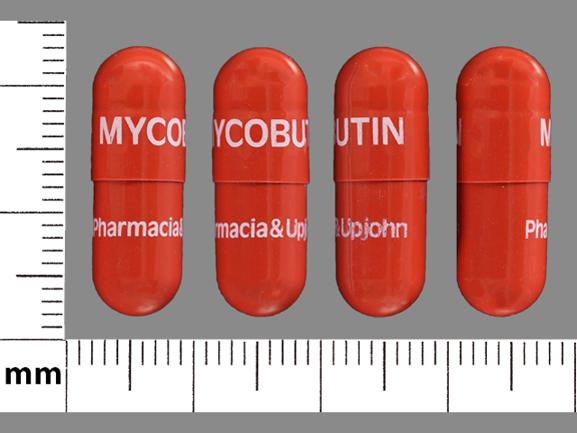Rifabutin Interactions
There are 459 drugs known to interact with rifabutin, along with 5 disease interactions. Of the total drug interactions, 207 are major, 214 are moderate, and 38 are minor.
- View all 459 medications that may interact with rifabutin
- View rifabutin disease interactions (5)
Most frequently checked interactions
View interaction reports for rifabutin and the medicines listed below.
- Aspirin Low Strength (aspirin)
- Ativan (lorazepam)
- Bactrim (sulfamethoxazole / trimethoprim)
- Bactrim DS (sulfamethoxazole / trimethoprim)
- Benadryl (diphenhydramine)
- Cipro (ciprofloxacin)
- Claritin (loratadine)
- Diflucan (fluconazole)
- Fish Oil (omega-3 polyunsaturated fatty acids)
- Flagyl (metronidazole)
- Flexeril (cyclobenzaprine)
- Lamictal (lamotrigine)
- Levaquin (levofloxacin)
- Lipitor (atorvastatin)
- Lyrica (pregabalin)
- Metoprolol Succinate ER (metoprolol)
- MiraLAX (polyethylene glycol 3350)
- NAC (acetylcysteine)
- Nexium (esomeprazole)
- Probiotic Formula (bifidobacterium infantis / lactobacillus acidophilus)
- Protonix (pantoprazole)
- Singulair (montelukast)
- Tylenol (acetaminophen)
- Vitamin B12 (cyanocobalamin)
- Vitamin C (ascorbic acid)
- Vitamin D3 (cholecalciferol)
- Xanax (alprazolam)
- Xarelto (rivaroxaban)
- Zofran (ondansetron)
- Zyrtec (cetirizine)
Rifabutin disease interactions
There are 5 disease interactions with rifabutin which include:
More about rifabutin
- rifabutin consumer information
- Compare alternatives
- Pricing & coupons
- Reviews (1)
- Drug images
- Side effects
- Dosage information
- During pregnancy
- Drug class: rifamycin derivatives
- Breastfeeding
- En español
Related treatment guides
Drug Interaction Classification
| Highly clinically significant. Avoid combinations; the risk of the interaction outweighs the benefit. | |
| Moderately clinically significant. Usually avoid combinations; use it only under special circumstances. | |
| Minimally clinically significant. Minimize risk; assess risk and consider an alternative drug, take steps to circumvent the interaction risk and/or institute a monitoring plan. | |
| No interaction information available. |
See also:
Further information
Always consult your healthcare provider to ensure the information displayed on this page applies to your personal circumstances.


